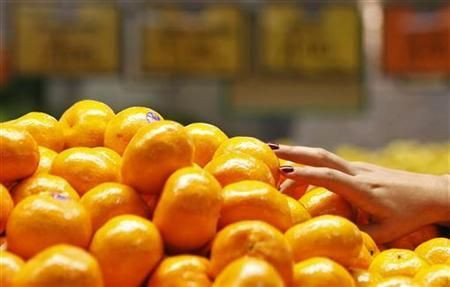South Africa's Economy At Risk Amid European Import Restriction

The European Commission on Tuesday announced restrictions on citrus shipments from South Africa due to an outbreak of “black spot” plant disease there. Now, South African politicians are concerned about the economic ramifications for the world’s largest citrus exporter.
“The citrus black spot outbreak undoubtedly poses a significant risk to our economy, international reputation and even food security,” said Annette Steyn, agriculture spokesperson for the Democratic Alliance party, in a public statement Wednesday.
She estimates the restrictions could jeopardize 80,000 permanent and seasonal jobs in South Africa and cost the country over $1.2 billion (13 billion Rand) every year.
South Africa is the world’s largest exporter of citrus fruit, accounting for more than 25 percent of global trade, according to the U.S. Department of Agriculture. More than half of its product goes to Russia and the European Union. The second-largest exporter is Egypt.
The E.U. placed a similar ban on South Africa citrus in November 2013. Though analysts said it wouldn’t have a major impact at that time, since exports usually dropped during that period, but USDA researchers warned of economic problems if it persists.
“We had to take these measures because of the high number of recent interception of infected citrus fruits at European border controls,” said EU Commissioner for Health Tonio Borg, in a Tuesday public statement.
“These emergency measures are being taken to protect European crops from citrus black spot, a harmful plant disease not native to Europe,” the statement says.
The new measures dictate that all citrus fruits from South Africa will undergo a more serious inspection than usual to check for “black spot” a fungal disease that is harmless to humans but is fatal to some plants. Authorities will have to take large samples to test for the disease, record any chemical treatments and conduct on-site inspections at orchards.
“While onerous, the fruit testing requirements, both in the orchard and packhouse, are within our industry capabilities,” said Justin Chadwick, CEO of the Citrus Growers’ Association of Southern Africa, to local news.
“Ominously, however, the decision does leave room for ‘additional measures’ to be imposed after five interceptions,” he added.
© Copyright IBTimes 2024. All rights reserved.












